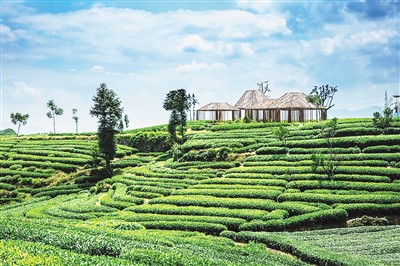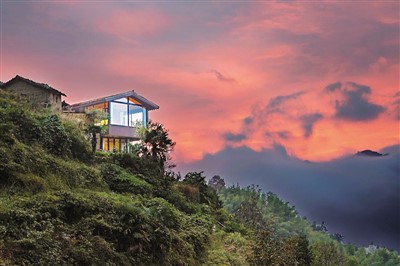
Photo shows Geminids meteor shower over a museum on Xingchen Mountain, Songyang county, Lishui city, east China's Zhejiang Province. (Photo courtesy of the interviewee)
Located in Lishui city, east China's Zhejiang Province, Songyang county is renowned for having the largest basin surrounded by mountains in the southwestern region of Zhejiang. With a forest coverage rate surpassing 80 percent, the county is blessed with majestic mountains, verdant forests, and lucid waters. It also proudly preserves picturesque traditional villages.
In recent years, Songyang county has transformed into a popular tourist destination by developing outdoor leisure tourism, tea garden sightseeing and B&B hotels.
Located more than 40 kilometers away from Songyang county, Xingchen Mountain stands at an average altitude of over 1,000 meters. This location is untouched by light pollution, which allows it to offer an expansive and unobstructed view of the night sky.
As darkness descends, the mountain's camping base and landscape viewing platform become a gathering place for stargazers, eagerly anticipating the appearance of stars in the celestial expanse.
"The mountain offers a stargazing experience comparable to a silver-level dark-night park, making it a valuable destination for star enthusiasts in the Yangtze River Delta," said Pan Bangxian, chairman of Xingchen Mountain Culture and Tourism Company. He added that this unique feature has drawn visitors from cities such as Shanghai and Hangzhou.

Photo shows the scenery of Damushan Tea Garden in Songyang county, Lishui city, east China's Zhejiang Province. (File photo)
The camping sites, scattered across different areas of the mountain, give tourists the opportunity to fully immerse themselves in a diverse range of natural wonders. This includes the beauty of clouds and sunrises, the soothing sound of wind rustling through pine trees, and the cheerful melodies of chirping birds.
The Damushan Tea Garden in Songyang provides a rejuvenating ambiance filled with the aroma of tea.
With an 8.3-kilometer cycling path and activities such as tea plantation tours, tea tasting, and tea picking, the tea garden's themed spring tours have become very popular. Tourists from Jiangsu, Shandong, Hunan, and other provinces come to experience the rich tea culture and embrace the tea garden lifestyle.
The Damushan Tea Garden attracts over 650,000 tourist visits annually. More than 60 tea-themed B&B hotels have been established, and they generate over 8 million yuan ($1.1 million) each year.
Songyang, one of China's top 10 ecological tea-producing counties, is home to over 120,000 mu (8,000 hectares) of tea gardens. The county has developed a comprehensive tea industry that covers tea consumption, cuisine, products, culture, tourism, and related activities.
Songyang county is renowned for its numerous traditional villages, including 78 national-level ones. In April 2016, a campaign was started to preserve and restore old houses to improve the living conditions of villagers and revitalize the resources of these villages. This initiative focused on promoting rural ecological restoration and developing various business models, such as converting old houses into B&B hotels, workshops, and studios, to stimulate rural tourism.

Photo shows B&B hotels transformed from old houses in Songyang county, Lishui city, east China's Zhejiang Province. (Photo courtesy of the bureau of culture, radio, television, tourism and sports of Songyang)
One notable example is Chenjiapu village. Since the introduction of B&B hotels and bookstores, this once abandoned village, with fewer than 40 residents, now boasts a permanent population of over 200 people.
By 2023, Chenjiapu village had welcomed more than 600,000 tourist visits, generating tourism revenue exceeding 30 million yuan.
Records show that more than 60 percent of the traditional villages in Songyang county have incorporated new business models, including B&B hotels, study tours, and cultural and creative products. The renovation of old houses has resulted in a significant increase of over 20 percent in the average annual income of villagers residing in the mountains.
Editor Ⅰ: Zhang Wenwen
Editor Ⅱ: Wu Dan
Editor Ⅲ: Liu Guosong














